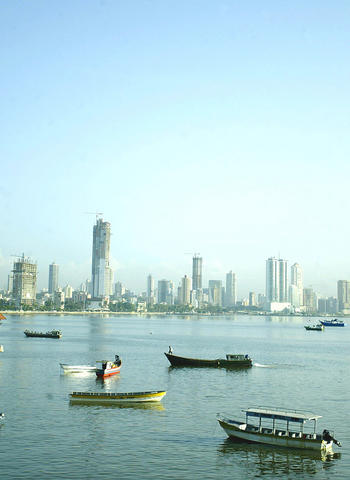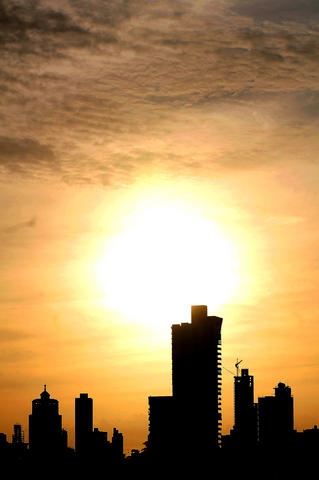"I don't get to travel as much as I'd like," says Xili, my guide in Panama City. "That's why I love meeting couch surfers. I feel like I'm traveling with them."
Born in Nicaragua but having spent 14 of her 26 years in Panama, she discovered couchsurfing.com just three months ago, becoming an instant convert to the concept of volunteering to host passing travelers. Although she can't follow the literal interpretation of having people sleeping on her couch ("My roommate doesn't understand"), she is happy to show just about anyone around the country's booming capital.
Panama City has been nicknamed the "Miami of the south" and the parallels are as glaring as the sunlight: waterside skyscrapers, palm-lined avenues, multicultural cuisine, mind-boggling commercialism ... but it was the tales of its pulsating nightlife that caught my attention. My travel-networking experiment across Central and South America got off to a great start in Ecuador, but I've yet to arrange a big night with a local.

If anyone was up for taking things up a notch, it was Xili, a hardworking, hard-playing lawyer. With her couchsurfing profile listing music, partying and dancing among her interests, I was sure she could show me a good time.
"I hope you're not planning to sleep tonight," she says with a grin, as we come face to face for the first time, having exchanged a series of e-mails. We've arranged to meet in Casco Viejo, the city's most up-and-coming neighborhood, where derelict colonial buildings are slowly being renovated and a creative undercurrent is bubbling.
What follows is an all-night tour of her favorite night spots. We start with Casco Viejo's La Casona de las Brujas (enlacasona.com, a live music venue with an open-air courtyard decked in fairylights) and Banos Publicos (Plaza Herrera's former public bathroom now hosting alternative rock bands). Then, in the early hours, we move on to the bright lights of Calle Uruguay, where minimalist S6IS satisfies Xili's craving for reggaeton, and the more mainstream rock venue Sahara fits the bill when she has a sudden "need for David Bowie."

Would I have found these places alone? Maybe. In such a short time frame? Unlikely. Xili's tour is the equivalent of a shot glass of pure liquor - it provides an instant hit of Panamanian nightlife, while the warm welcome from all her friends makes me feel right at home.
As for the nightlife itself, Calle Uruguay may be the country's much-hyped nightlife avenue, but, for me, it's the Casco Viejo venues - less commercial, more bohemian - that leave a lasting impression.
Getting back to my hostel just before dawn, an 8am start the next day is far from ideal, but I have prearranged a meet with my second Panama City contact, Gabriel from asmallworld.net.

ASW is one of a handful of invite-only travel networking sites (see also yacht6.com). How do you gain access to such a hallowed portal? Try asking around. A vague acquaintance - a self-confessed social-networking addict - helped get me through the door. (Although, if I fail to resist temptation to spam fellow members James Blunt and Naomi Campbell, I'll be out.)
ASW is undeniably elitist, nicknamed Snobster in reference to early social networking site Friendster. However, in my limited use, I've always met exceptions to the rule. Gabriel - a thirtysomething owner of an office supplies company and yoga teacher - is such an example: clearly well off, but down-to-earth, unassuming and very generous in his offer to let me join his out-of-town kitesurfing excursion.
Gabriel and friends spend every weekend camping out at Punta Chame, a little-known beach an hour and a half's drive from the city. "You just arrived in Panama and you're already at Punta Chame?" asks Amit, a fellow ASW member and kitesurfing addict, as I dip my toes in the Pacific for the first time. "You've certainly started at the top."

Jutting out on a peninsula, a clear day here offers views of the city and, when the tide is out, I have its expansive sands almost to myself, watching the kitesurfers crisscross the gentle waves. Later, as the wind subsides, we convene in the beach's only restaurant to refuel on fresh fish and patacones (thick slices of plantain, squashed and fried).
The surfers are a sociable bunch and I find myself leaving the beach with a collection of phone numbers. After just one week, I feel like I've already begun to establish a small social circle through Gabriel and Xili (who I see many more times). After receiving invites to group dinners, house parties, karaoke nights and even a gig in a rainforest, I become even more convinced that travel networking is the way forward.
I'm starting to feel Panama will be tough to leave, but, fortunately, I have one more week. Next up I'm planning to see the less glamorous side of the country in Colon with Xili, and meet Toyo, a travel-networking member of the Kuna tribe. "Amiga!" he writes, when I tell him I'm in the country. "Welcome to my home. See you next week."
Travel networking etiquette
* Keep it personal
* Contacting someone saying simply "Hello. Can I stay at your house for a week?" is unlikely to elicit a positive response. Introduce yourself and your plans. Where possible make the person feel you've chosen them for a reason.
* Always reply
* If you request to meet someone and they send a personal response to say they won't be able to make it, return the courtesy with a reply rather than just moving straight on to the next person. Communicate
* Keep to your plans. Don't leave your host waiting for you. Don't pull out at the last minute.
* Give a little
* If you're staying at someone's house, bring a gift (maybe something typical from your own country). If they're showing you around town, buy lunch or drinks if you can, and always pay your way.
* Be courteous
* If staying at someone's home, do not use it as a base to party with other people. Fit in with host's schedule. Don't sleep in for hours. Don't overstay your welcome.
* Make sure you spend time getting to know your host. If you're just after free accommodation or a tour guide, you've got the wrong idea.

On April 26, The Lancet published a letter from two doctors at Taichung-based China Medical University Hospital (CMUH) warning that “Taiwan’s Health Care System is on the Brink of Collapse.” The authors said that “Years of policy inaction and mismanagement of resources have led to the National Health Insurance system operating under unsustainable conditions.” The pushback was immediate. Errors in the paper were quickly identified and publicized, to discredit the authors (the hospital apologized). CNA reported that CMUH said the letter described Taiwan in 2021 as having 62 nurses per 10,000 people, when the correct number was 78 nurses per 10,000

As we live longer, our risk of cognitive impairment is increasing. How can we delay the onset of symptoms? Do we have to give up every indulgence or can small changes make a difference? We asked neurologists for tips on how to keep our brains healthy for life. TAKE CARE OF YOUR HEALTH “All of the sensible things that apply to bodily health apply to brain health,” says Suzanne O’Sullivan, a consultant in neurology at the National Hospital for Neurology and Neurosurgery in London, and the author of The Age of Diagnosis. “When you’re 20, you can get away with absolute

May 5 to May 11 What started out as friction between Taiwanese students at Taichung First High School and a Japanese head cook escalated dramatically over the first two weeks of May 1927. It began on April 30 when the cook’s wife knew that lotus starch used in that night’s dinner had rat feces in it, but failed to inform staff until the meal was already prepared. The students believed that her silence was intentional, and filed a complaint. The school’s Japanese administrators sided with the cook’s family, dismissing the students as troublemakers and clamping down on their freedoms — with

As Donald Trump’s executive order in March led to the shuttering of Voice of America (VOA) — the global broadcaster whose roots date back to the fight against Nazi propaganda — he quickly attracted support from figures not used to aligning themselves with any US administration. Trump had ordered the US Agency for Global Media, the federal agency that funds VOA and other groups promoting independent journalism overseas, to be “eliminated to the maximum extent consistent with applicable law.” The decision suddenly halted programming in 49 languages to more than 425 million people. In Moscow, Margarita Simonyan, the hardline editor-in-chief of the